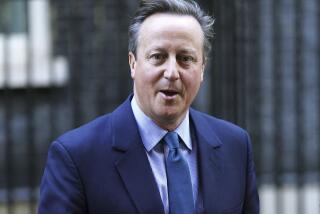Britain’s David Cameron defends Cabinet member in scandal
- Share via
Reporting from London — British Prime Minister David Cameron gave his full backing Thursday to a top Cabinet minister who has denied rumors that he is gay and that he carried on a relationship with a young aide.
Cameron said that Foreign Secretary William Hague enjoyed his “100% support” in spite of what some pundits are calling “the Hague affair” — and what Hague himself vigorously insists was a nonaffair.
Hague, who is married, said in an unusually personal statement this week that any allegation of an “improper relationship” between him and Christopher Myers was “utterly false.” Though only 25 and with little experience in foreign policy, Myers was appointed as one of three special advisors to Hague because of his “commitment and political talent,” the statement said.
Britain’s top diplomat added that rumors of strain between him and his wife, Ffion, were baseless, but might have arisen because the couple have been under some stress recently from unsuccessful efforts to have children and from the grief of multiple miscarriages.
FOR THE RECORD: An earlier version of this report referred to Christopher Myers as Myer.
With its intimate details of his marriage, Hague’s statement came in response to a fellow Conservative Party member’s blog item over the weekend that noted how Hague and Myers sometimes shared a hotel room while campaigning during Britain’s general election in May. The item described the two men’s “body language at breakfast” as “eye-opening.”
News outlets pounced on the gossip and published photos of Hague and Myers walking together and smiling, scenes hardly unusual for a boss and an employee. But the stories questioned why Hague had hired such a foreign policy neophyte at public expense and why he had three special advisors rather than the customary two.
Even fellow Conservatives have criticized Hague, saying he showed poor judgment, particularly in sharing a hotel room with an aide, which the foreign secretary termed an innocent occurrence.
Myers, who has not made any comments to the news media, has stepped down from his position “as a result of the pressure,” Hague’s statement said.
Hague, 49, who is widely respected for his abilities, is a former leader of the Conservative Party. He first made a splash as a teenager for a fiery speech he gave at a party conference presided over by then-Prime Minister Margaret Thatcher. One of his first acts as foreign secretary was to visit Washington to bolster Anglo-American ties.
On Thursday, as Cameron made known his support for his colleague, Hague said he felt moved to issue such a personal and lengthy statement because he and his wife had “had enough of circulation of untrue allegations.”
“At some point you have to speak out about that and put the record straight,” he said, apparently not intending the pun. Coincidentally, he spoke at a news conference with German Foreign Minister Guido Westerwelle, who is openly gay.
These days in Britain, news that a senior politician is or might be gay is usually greeted by a yawn. Several gay ministers served in the Labor government that ruled from 1997 until the party was booted from power in May, and the new Conservative-led coalition also includes an openly gay minister. Last week, a second minister announced that he was gay and that he was separating from his wife, which seemed to elicit a collective shrug.
But after a major scandal last year over abuse of parliamentary expense accounts, the British news media have become particularly vigilant for any signs of personal relationships with financial implications, such as the hiring of a special advisor.
Soon after the coalition government took the reins, David Laws, a Liberal Democrat, was forced to step down as chief secretary to the treasury when it emerged that he had paid thousands of dollars in rent, using taxpayer money, for a London apartment belonging to his male partner.
henry.chu@latimes.com
More to Read
Sign up for Essential California
The most important California stories and recommendations in your inbox every morning.
You may occasionally receive promotional content from the Los Angeles Times.













